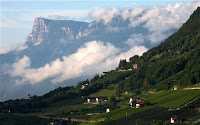 German Language Adds 5,000 Words
German Language Adds 5,000 WordsBBC:
Around 5,000 new words have been officially added to the German language - many of them from the English-speaking world.The newcomers appear in the latest edition of the respected German dictionary, Duden.
Germans can now go to "eine After-Show-Party", as long as it is not "eine No-Go Area", and meet "das It Girl" - if she does not have "der Babyblues".
Fans of social networking can also "twittern", which means to Twitter.
The financial crisis has inspired many of the new entries in the 135,000-word dictionary.
'Kreditklemme'Appearing for the first time are "Kreditklemme" (credit crunch), "Konjunkturpaket" (stimulus package) and "Abwrackpraemie" (car scrappage bonus).
The word "Ehrenmord" (honour killing) also makes it into the dictionary, which was published on Wednesday.
The German language is known for its extremely long compound nouns.
And the new edition includes a 23-letter example: "Vorratsdatenspeicherung", which means the saving of data relating to supplies.
The first Duden dictionary was produced in 1880 and consisted of just 27,000 words. [Source:
BBC] | Wednesday, July 22, 2009

